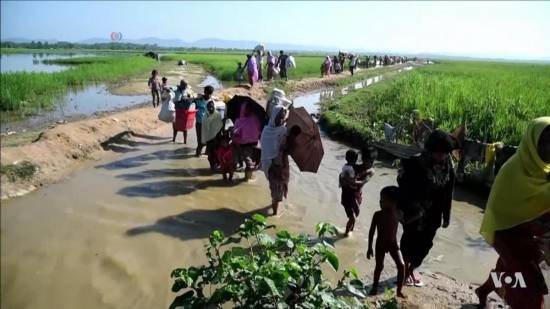Bangladesh Moves 2,500 Rohingya Refugees To Remote Island, Despite Human Rights Concerns Featured
On November 27th, around 2,500 Rohingya refugees were transported from their settlements in the Bangladeshi town of Cox’s Bazar to Bhasan Char. Bhasan Char is a flood-prone island, currently being developed by the Bangladeshi government in order to eventually house over 100,000 refugees. The international community has grown increasingly concerned about Bangladesh’s treatment of Rohingya refugees and various sources are now claiming that the Rohingya’s recent transportation has been done without the refugees’ prior consent.
Filippo Grandi, the United Nations High Commissioner for Refugees, is one of the many that have voiced concerns over the recent move. On November 29th, he made a Twitter post stressing the importance of dialogue between local authorities and the U.N. According to the U.N. office in Bangladesh, the United Nations has not been involved in the local government’s project of moving people to Bhasan Char. Humans Rights Watch has found even more alarming data, having interviewed 12 families whose names appeared on the transportation lists but who had not volunteered to go.
Earlier this year, Amnesty International published a concerning report about the quality of life on Bhasan Char. The report contained allegations of unhygienic living conditions and limited access to healthcare and education facilities. Additionally, Amnesty has documented harassment cases of refugees who have been sexually assaulted by local camp officials.
Bangladeshi officials maintain that the international community does not to be concerned about the country’s refugee situation. Shortly after the alarming reports of the relocation process emerged, Mohamed Shamsud Douza, the deputy Bangladeshi government official in charge of the refugee situation, chose to reiterate the voluntary aspect of the relocation process. The Bangladeshi Ministry of Foreign Affairs has also disputed international organizations’ negative claims, stressing that Rohingya refugees have access to all modern amenities.
Nonetheless, the international community has been lukewarm in its response. The European Union, for example, has refused to comment on the relocation effort before the U.N. has been permitted to carry out humanitarian missions to the island. This reaction is not negative in itself. However, the Bangladeshi government has plans in place to eventually move around 100,000 refugees to the unsafe island of Bhasan Char, an island strongly affected by floods and cyclone seasons. Therefore, firmer action is urgently needed.
Reports of unfair relocation of Rohingya refugees have emerged from multiple sources and should be taken seriously. Donor governments that are closely linked to the Rohingya crisis (the United States, United Kingdom, Canada, Japan, and Australia) should take a firm stand against the move to relocate the refugees to Bhasan Char.
As of this moment, Rohingya refugees still face persecution in their homeland, Myanmar, and have been sheltering in Bangladesh for decades. In 2017, an estimated 750,000 additional refugees were forced to flee to Cox’s Bazar after further killings and a wide-scale police crackdown in Myanmar. According to the November 2020 Institute of Medicine report, Bangladesh’s government is now dealing with overcrowding in 34 large refugee camps.
The Bhasan Char relocation is undoubtedly a new attempt to relieve tensions on the government’s refugee program. Even so, Bangladesh cannot be praised for its actions while Rohingya refugees are suffering immensely because of the new scheme. Furthermore, if the government moves ahead with its plans to relocate refugees in even greater numbers, over 100,000 people’s lives will be put at grave risk. The U.N., the European Union and other international organizations must act prevent this, and they must act now.


